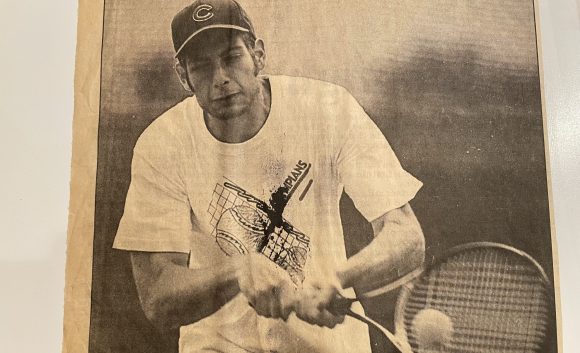I highly recommend you watch the video version of this podcast.
Click on the link to go to the video.
I won a few big matches on my high school Tennis team, but I was never awesome. I never won the big tournaments. What killed me was that I always had more fun and played better in practice than in big matches when pressure made my muscles tight.
For the last few months, I’ve been fascinated by a discovery a tennis pro made 50 years ago that’s revolutionizing how people perform under pressure. It started when I listened to “The Coach in Your Head,” an episode from Michael Lewis’s “Against the Rules” podcast.
Check out the video I made breaking down the whole story on my YouTube channel, I Learned It on a Podcast.
We all experience this. Job interviews, presentations, equipment demonstrations. We “play tight” when stakes are high, performing worse at the very things we’ve trained for.
Tim Gallwey figured out why this happens. In 1974, he published The Inner Game of Tennis, decades before today’s coaching boom. Like me, he was skilled but didn’t perform his best when it mattered most. While teaching tennis at a country club during summer break, he had a profound realization.
Instead of giving a student technical instructions for hitting topspin, Gallwey stayed quiet and just tossed balls for 3-4 minutes. Suddenly, the guy was hitting perfect topspin shots. His next lesson, he told a complete beginner to shut her eyes and see herself hitting the ball. She executed perfectly, naturally doing everything he would have taught her.
His realization was simple. Performance isn’t about more instruction. It’s about eliminating mental interference.
This method became known as mind coaching. It helps people notice when thoughts create tension and worry, then redirects focus to what’s actually useful. Michael Lewis’s daughter Dixie, a competitive softball player, worked with a mind coach who transformed her brutal self-talk from “don’t screw up” to “loose and aggressive.” When she focused on that positive phrase, her muscles could work instead of being locked up by tension.
I’ve started trying to apply the “loose and aggressive” mindset in my daily life. I think about it in my morning routines, content creation, and business negotiations. Recently, teaching my 3-year-old to throw a frisbee, instead of explaining technique, I demonstrated it to him a few times and said “just watch and do it.” In minutes he was doing it–of course in his own way with two hands, but he was really doing it, probably better than if I’d verbally instructed him
Today mind coaches work with firefighters developing mental routines for emergencies, executives learning to compete rather than just manage.
Perhaps this week, try to feel where you are playing tight. Maybe you’ll notice you’re so focused on not failing that you can’t access what you actually know. Or, if you’re coaching other people, you might ask what they noticed instead of listing what they did wrong. The big puzzle I find is to not let yourself get tight about trying to be loose. It just creates more of the same problem.
Question: Do you perform well under pressure? What is your secret?
Podcast: Play in new window | Download


6 Comments
I always played better in practice. When I tried out for the Cubs they told me to go home. Even if I hadn’t been so wild I probably never would have been signed but It would have been more satisfying for me. Enjoyed the blog, Noah. Hang loose.
Thanks!😀
I keep working on it. It’s a challenge to work hard at something and yet part of what you’re working on is not being critical of yourself when you don’t do it as well as you like.
One thing I have really focused on is less self judgment. That’s why I’ve really tried to eradicate the word “should” from my vocabulary. Only “could” is allowed.
Do you perform well under pressure? What is your secret?
Noah.. You will have to model me to find out. I don’t honestly know. I am a nice guy who is distracted when not under pressure. Under pressure I get shit done. I’ve always done better on ATC check rides than others in training. Once upon a time I landed an old Cessna 310 TWIN in Buffalo in a blizzard with severe ice. Windshield frozen over, 5 inches of ice on the tip tanks with 6 people aboard. I had to look through the side window to land. Approach speed was 20 knots over normal, and the 310 landed smoothly. No issue. Yes my ATC briefing was fine leaving Jamestown. After takeoff a King Air reported severe ice. This is one of a multitude of various war stories of my behavior under pressure. I’ve not had 99 lives but I’m close to it. Thanks for asking. It gave me an opportunity to reminisce. Everyone who can afford it should own an airplane. It makes your world much smaller.
Sounds like you do perform well under the gun.
My question to you is do you think there’s a difference between performing well under pressure when your life or someone else’s truly depends on it versus performing well under pressure when the stakes aren’t quite as desperate? Maybe in such an extreme state your mind is more likely to rise to the occasion. ?
“Be the ball”
https://www.dailymotion.com/video/x80q6y1
Classic!